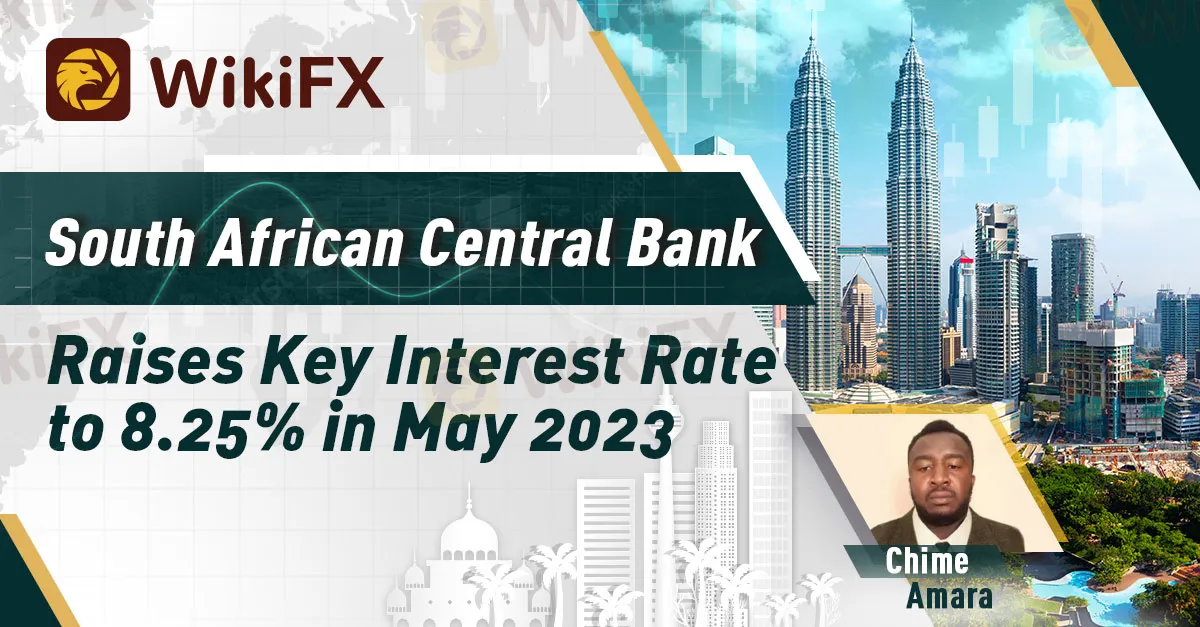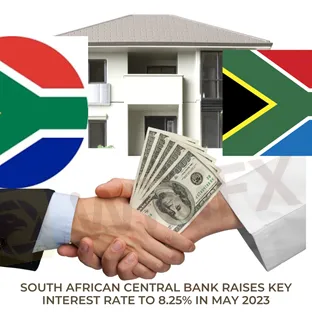简体中文
繁體中文
English
Pусский
日本語
ภาษาไทย
Tiếng Việt
Bahasa Indonesia
Español
हिन्दी
Filippiiniläinen
Français
Deutsch
Português
Türkçe
한국어
العربية
South African Central Bank Raises Key Interest Rate to 8.25% in May 2023
Abstract:In a bid to contain the rising inflation rate, South African Reserve Bank (SARB) raised its key interest rate by 50 basis points to 8.25% in May 2023 marking its highest level since 2009.

By: Chime Amara

The South African Reserve Bank (SARB) raised its key interest rate by 50 basis points to 8.25% in May 2023, to contain inflation the country's high inflation rate. The move was the tenth consecutive rate hike by the SARB, and brings the repo rate to its highest level since 2009.
In a statement, the SARB said that the decision to raise rates was taken in light of the “continued high levels of inflation” in South Africa. Inflation in South Africa rose to 6.5% in April, well above the SARB's target range of 3% to 6%.
The SARB said that it expects inflation to remain elevated in the near term, but that it should start to decline in the second half of 2023. The bank further stated that it remains committed to bringing inflation down to its target in 2023.
The rate hike is likely to have a significant impact on the South African economy. Higher interest rates will make it more expensive for businesses to borrow money, which could lead to slower economic growth. However, the rate hike could also help to cool inflation, which would benefit consumers.
The rand, the South African currency, fell sharply after the rate hike, hitting a record low against the US dollar. The rand has been under pressure in recent months due to several factors, including the country's high debt levels and political uncertainty.
Overall, the rate hike is a good sign that the SARB is taking inflation seriously. However, it remains to be seen whether the rate hikes will be enough to bring inflation under control. The SARB will likely continue to monitor inflation closely in the coming months and may raise rates further if necessary.

Disclaimer:
The views in this article only represent the author's personal views, and do not constitute investment advice on this platform. This platform does not guarantee the accuracy, completeness and timeliness of the information in the article, and will not be liable for any loss caused by the use of or reliance on the information in the article.
Read more

March Oil Production Declines: How Is the Market Reacting?
Oil production cuts in March are reshaping the market. Traders are closely watching OPEC+ decisions and supply disruptions, which could impact prices and future production strategies.

How to Calculate Leverage and Margin in the Forex Market
Leverage amplifies both potential profits and risks. Understanding how to calculate leverage and margin helps traders manage risks and avoid forced liquidation.

RM1.29 Million Lost in ‘C Baird VIP’ WhatsApp Scam
A 43-year-old company auditor and subcontractor in Malaysia became the latest victim of an elaborate investment scam after losing RM1.29 million to a fraudulent scheme promoted via WhatsApp.

U.S. March ISM Manufacturing PMI Released
The U.S. March ISM Manufacturing PMI data shows that manufacturing has contracted for the first time, and investors should pay attention to future changes and impacts on the sector.
WikiFX Broker
Latest News
Exposing the Top 5 Scam Brokers of March 2025: A Closer Look by WikiFX
Gold Prices Climb Again – Have Investors Seized the Opportunity?
Webull Launches SMSF Investment Platform with Zero Fees
Australian Regulator Warns of Money Laundering and Fraud Risks in Crypto ATMs
The Withdrawal Trap: How Scam Brokers Lure Victims into Paying More
FCA to Investors: Think Twice Before Trusting These Brokers
Trump\s tariffs: How could they affect the UK and your money
Trump gambles it all on global tariffs he\s wanted for decades
TradingView Brings Live Market Charts to Telegram Users with New Mini App
HTFX Spreads Joy During Eid Charity Event in Jakarta
Currency Calculator







